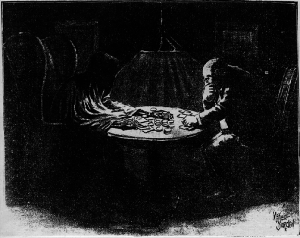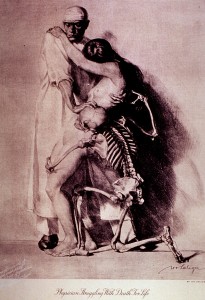May 6th, 2016
Declaration of Death
Ahmad Yousaf, MD

Ahmad Yousaf, MD, is the 2015-16 Ambulatory Chief Resident in Internal Medicine at Rutgers New Jersey Medical School.
“Is he dead?”
I stepped up closer. He was yellow. Bright yellow. Steve had been admitted to the hospital for altered mental status when his last PET Scan revealed that the pancreatic cancer had spread from the tail of his pancreas into his liver where it now blocked the ducts that carried the bile out of his body and left him jaundiced. I had been paged a few minutes earlier by a frantic nurse who told me that the patient had stopped breathing. It was 1AM and although I could have been asleep, I was in my 2nd month of residency and too scared to rest my eyes. I rode the elevator up to the 9th floor with almost no idea of what I was going to do if, in fact, he was no longer breathing.
I had received sign-out from the day team that the patient was on inpatient hospice and ‘no heroic measures’ were to be taken if his heart stopped beating overnight. “Heroic measures?” I thought to myself. What did that mean? Thoughts of Superman performing super effective chest compressions and pushing epinephrine crossed my mind. The elevators opened, and I walked toward his room.
Earlier in the evening, I had introduced myself to his family who had been sitting by their dying father and husband. I had tried to smile warmly but was afraid I came off as an insensitive, grinning madman. I probably had stayed too long to overcompensate for my awkward smile; I had rambled about things that didn’t really matter. I almost made a joke… then thought better of it. I had ended the torturous encounter with a “so sorry” (I was not sure if I was apologizing or just searching for any words to fill the void) and a “if you need anything at all …” After fleeing the room I prayed to God that this patient would not die on my time. Unfortunately, my prayer was not answered that night.
Now, I stepped into Steve’s room and quickly realized that it was no longer his. It smelled of death, and I felt like I was walking into a room frozen in time. I had this eerie sense that I was walking in right after another had left with something more valuable. The silence was profound… except that there was something… I heard the sound of breathing. I approached his bed, and then I saw her. His wife had pulled up a chair next to him and was fast asleep, unaware of her husband’s passing. I stared at Steve and then back at his wife. How long should I leave them like this? She needs to know… but how terrible a thing to wake her up to the worst news of her life. I did not want to be the one to do that. I was supposed to be a preventer of death…

“Pssst!” The nurse was now at the door trying to get my attention. I looked over and shrugged my shoulders. I had no idea what to do. “You have to tell her,” she whispered sharply, “you have to pronounce him dead!”
My confusion must have been apparent because she rolled her eyes and said, “You need to listen to him and give him a time of death!” I nodded as if I knew that already. Much later, I heard about another intern in a similar predicament — she had been told that she was to pronounce a patient dead. She entered the room, which was full of the deceased’s family and stated loudly, “I now pronounce you dead!” She then exited hurriedly and told the nurse that the ‘pronouncement ceremony’ was over.
I exited the room and told the nurse to give me a second. I pulled out my Intern Manual and found the section about how to pronounce a patient dead. The manual told me to listen for heart sounds with my stethoscope placed on patient’s chest for an entire minute and, if heart sounds were absent, I should pronounce the patient dead and document the time of death in the chart. I re-entered the room with a bit more confidence and looked at the sad portrait in front of me — a loving wife lying with her beloved husband. It felt like a dream. I observed her chest rise and fall with every breath and his stay so motionless. He looked far more at rest than she did; her brow was furrowed, the area around her eyes dark with circles of worry and sleep deprivation. I moved close to her and placed my hand on her shoulder. “Ma’am… Ma’am.” She stirred a little… I glanced back at the nurse in the entrance of the room and realized she was growing more and more impatient. “Ma’am… we need to talk.” Her eyes began to open slowly as she rose to consciousness and then, suddenly, she sat up…
“Is he dead?”
The words hurt me. As if she had thrown bricks into my chest. I could not find the yes that was buried somewhere between my heart and my throat… I nodded. She let out a deep sigh and with it, tears fell from her eyes.
“I’m… I’m sorry.” Those words again. I really do not know why they always seem to fall out of my mouth in moments of perplexity. I stood there for a while watching the two of them. Watched her wrap her arms around him and speak to him as though he would answer. The nurse came in. She went over to Steve’s wife and asked her if there was anyone she wanted to contact. The nurse got a number and left the room. I still had not moved. This was the first patient I had ever pronounced dead. I looked at the clock: 1:54AM. That would go into a record somewhere, because I had stated it was the time he died. The moment was heavy… heavier than I had ever anticipated. I was no longer one who just tried his best to prevent death; I was now also an announcer of its arrival.




Every soul will taste death, and you will only be given your [full] compensation on the Day of Resurrection. So he who is drawn away from the Fire and admitted to Paradise has attained [his desire]. And what is the life of this world except the enjoyment of delusion.
كُلُّ نَفْسٍ ذَائِقَةُ الْمَوْتِ ۗ وَإِنَّمَا تُوَفَّوْنَ أُجُورَكُمْ يَوْمَ الْقِيَامَةِ ۖ فَمَن زُحْزِحَ عَنِ النَّارِ وَأُدْخِلَ الْجَنَّةَ فَقَدْ فَازَ ۗ وَمَا الْحَيَاةُ الدُّنْيَا إِلَّا مَتَاعُ الْغُرُورِ ﴿١٨٥ آل عمران
Nice story D.Ahmad
Thanks for this great comment Myada Yousof
It sounds like you are doing great – you are compassionate and paying attention, bringing your knowledge along with you. I have been the spouse in the situation you mention and just that you are there and that you say SOMETHING (it doesn’t really matter what) is half the battle. Never run from the hard stuff, the confrontations, the honesty – your families and patients need someone to tell them the facts. I have nothing but respect for all the physicians and other health care providers who helped in our journey.
A beautiful piece, Ahmad. Thank you.
I would like to know the artists and titles for the images you used. They are lovely.
Frank Baudino: Right-clicking on the image gives you the choice to Search Google for image. For example, for the first image, Google suggests Ivo Saliger.
Saying you’re sorry and then standing there quietly and saying nothing was the best thing you could have done.
Yes stephanie, I agree with you…
Great narrative! At least you were in your first year. This happened to me when I was a 3rd year. I am a pediatric resident, and in pediatrics, kids don’t die that often. I was called into the room of a 20 some year old with cancer who was admitted with altered mental status. After getting sign out, I go into the room (this is July, all interns are new) where this patient is breathing about 3-4 times per minute, completely pale, cold and diaphoretic and I have to break the news to her husband that she can pass away any minute. It was at that moment that I have literally experienced the feeling of loss of words. We are tought how to prevent patients from dying, but no one teaches you what to do when you can not prevent that from happening.
Great article,
Makes me feel that we all are not facing that alone!
Thank you for this beautiful essay. Your compassion is obvious and a model for all caregivers, regardless of status. Your comments and actions were measured, thoughtful and deliberate. In other words perfect for the situation.
nice pic by austrian artist ivo saliger.
Beautiful…and also horrible.. This is our work, I’m a critical care doctor, we work between the death, we have to fight for live and not less important, we have to fight for a good death, not longer the treatments without expectation, be humans… We work every day with the death, it’s the reality.
Sorry to have to take such a contrarian opinion to your article. While I understand that you are the beginning phase of your learning, your article would be a wonderful article if written for a High School essay competition. However, you are a grown man, facing real life situations, and quite frankly, you flunked miserably. Standing in the patients room, looking like a deer in headlights waiting for the nurse to give the ‘ok’ signal as to how to behave is quite disturbing and sadly disappointing, to say the least. You act as it you were a 10 year old boy in a school play, who forgot his lines and looked over to the drama teacher with a blank stare for help, as if to say, what do I do next?
Dr. you have a lot of growing up to do. Like other ‘millennials’ in your age group who have spent the better part of your lives on face book, twitter and texting, the art of knowing how to communicate and conduct oneself with dignity in real life situations is a skill beyond your years. It is a skill sadly lacking in those of your age group. How folks like yourself with learn how to act in various grown up situations, is beyond me. Hopefully, one day you and others your age will learn that.
Your lack of maturity is overwhelmingly obvious and hopefully as you get older and reflect upon this article, you too, one day will realize just how immature it all was.
Best of luck in your continued area of medicine.
Dr. Hoffer,
What planet do you live on?
Thank you Dr, Hoffer….I was a surgical pa. for over 20 years and had to train med.students,pa students and first yr, residents.in surgical tech.and patients care.wound care,and ER consults….my gold was to watch them and let them do as much as possible safely.It builds confidence. .I watch them” GROW” ready for all that awaits them……..frank baudino,…Dr,Hoffer lives on GODS GOOD EARTH.
Thank you. Given this degree of experience and you’re acknowledgement of God it surprises me that your comment to the original article was so lacking in compassion and empathy.